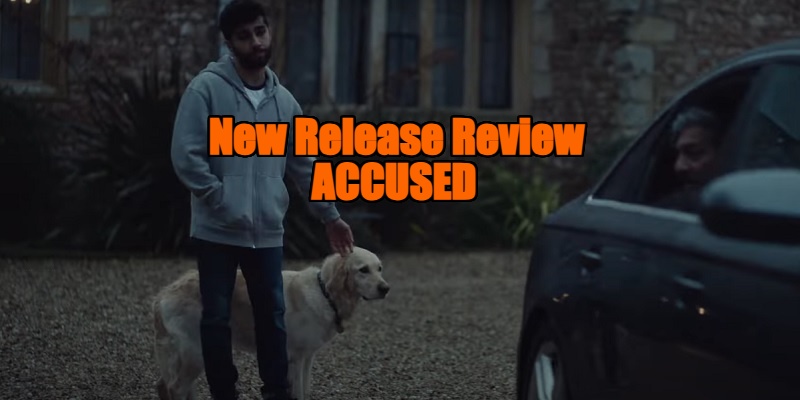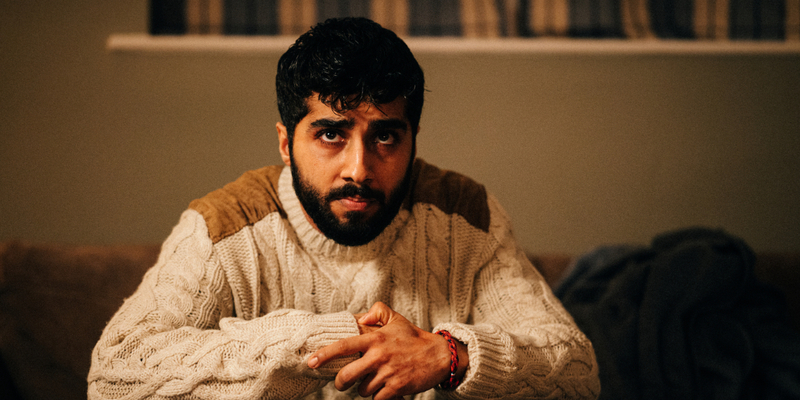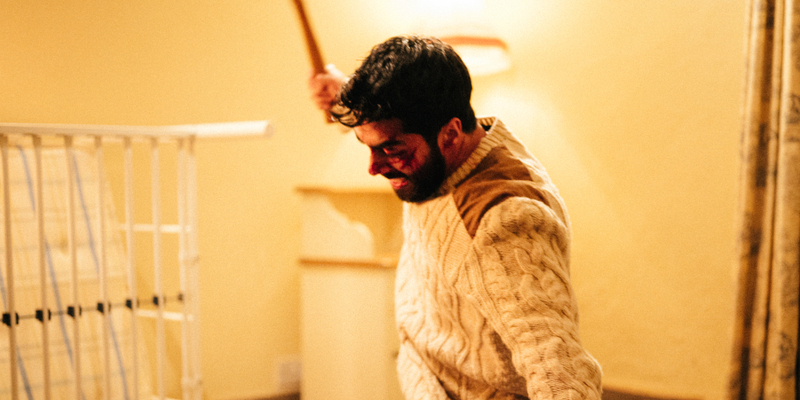
Review by
Benjamin Poole
Directed by: Philip Barantini
Starring: Chaneil Kular, Jay Johnson, Robbie O'Neill, Frances Tomelty, Nitin Ganatra, Nila Aalia,
Lauren Ajuyo

It must be fucking great to be a bigot. Imagine it: being able to
blithely blame all of your troubles on a vague idea of a social category
different to yours; all of your manifest shortcomings absolved by an
abstract group. If it is someone else's fault then it is not yours,
after all. Can't get a job? That’s the diversity quota. Struggling with
finances? All the money going to the immigrants, innit. Women aren't
interested in your clumsy advances? That's THEIR fault, the "femoids."
And even if there isn't an act of displacement afoot, then I suppose it
must be gratifying to have an enemy, someone to make you feel like a
hero, someone to vilify. Someone who will always, always be more
vulnerable than you within their societal minority (surely this is the
reason for homophobia and trans panic?). Of course, common sense,
average intelligence and basic human decency precludes us from such a
simple option, but, if we extend our sympathy to those less secure then
we may recognise how the thick, the violent and the self-loathing are
drawn to dabble.
Or maybe not, because at the actual, disingenuous centre of the bigot is
a preening sense of entitlement, of toxic presumptions which are being
infuriatingly denied.

The cap-fitting villains in Philip Barantini's incendiary
Accused (working from an excellent script from
Barnaby Boulton and James Cummings) who arrive in the
film's third act are tellingly convinced that they are heroes, action
heroes nonetheless, righting an observed wrong and all whipped up by
their own virulent susceptibility. Flashback to almost a day ago, where
we see their innocent target Harri (Chaneil Kular) about to catch
the train from London to the surrounding countryside, where he will
housesit for his parents and look after their gorgeous Golden Retriever,
Flynn. Perhaps his pretty girlfriend Chloe (Lauryn Ajufo) will
meet him later: they have a warm, loving relationship, as evidenced by
their constant back and forth via social media platforms (an early
indicator of Accused's suggestion of social media's centrality to our lives). A
good-looking young man of Indian descent, with supportive people around
him and a successful career, Harri is the sort of person who already
makes the bigots a bit antsy about themselves...
Checking his phone en route, Harri is understandably alarmed to discover
that elsewhere on the same line there has been an explosion, which from
the looks of it, is linked to terrorist activity. The outcome of having
caught a later train doesn't bear thinking about. At his destination,
Harri's dad is visibly relieved when he picks him up, and the ensuing
evening has a warm glow of relief, yet it is underpinned by the sickly
dread which must affect certain British families when the word terrorist
characterises the day's news: a gallows humour and withdrawal to deflect
the potential coming days of suspicious looks and noxious media
commentary.

The issue with bigots is that they want to believe the worst, they
thrive on it: that is their sickness. Every immigrant IS a potential
rapist, all trans-women want to invade YOUR toilets. Don't tell me they
don't love it, that they don't look for reasons to righteously hate.
These people live for a target. Just ask Mohammed Ramzan. Or, indeed,
our own Harri, who, in a flurry of snap verdicts via the moronic mob
mentality of social media where he features in the background of a
vacuous selfie, is fingered for the attack (we never learn; as I write
Twitter is alive with glee, arrogantly guessing who the sex offender
comedian a Channel 4 Dispatches programme is about to expose is, as if
it's a parlour game and not the real lives and reputations of the names
bandied about). After all, Harri is of Asian ethnicity, and he was at
the train station, so it must have been him. Hercule Poirot has nothing
on this mob. Furthermore, the film's title is a misnomer, as the
consensus doesn't allege, but judge, condemn and, when a couple of
cowards rock up at the house where Harri spends the night alone (even
Chloe has been swayed by the discourse) enact a sentence.
In the last act, Accused accelerates into an anxiety
inducing home invasion movie, which calibrates its socio-political
rhetoric with severely realised genre pleasures. The two factors are
wrenchingly symbiotic and generate some extremely tense filmmaking: the
unpleasantly credible realisation of the flag-shagging intruders, who
are clumsy, desperate to prove themselves and operate within apparent
license granted by pernicious media narratives; versus Harri whom the
odds are completely stacked against, as the world at large needs him to
be the culprit.

Accused is a hard watch; a best it will make you feel
deeply uneasy, at worst it will leave you furious. Because nothing in
the film (ok, apart from a conveniently disintegrating tree house, which
we forgive because by then the film, Harri and the audience have earned
it) is completely within the realms of grim plausibility. When it does
transpire that Harri is innocent (you know, when the mob have got bored
and moved on to vividly cancelling a popstar for a gormless opinion or
something), and the actual offender is collared, the optics change
depending on his skin tone. The white bomber is a "gentle soul" who was
somehow pushed to mass murder by his "mental state," despite
premeditated evidence of a hate manifesto. We end with Harri, his
beautiful face bruised and beaten, staring into the camera, finally
refracting Accused's ambiguous title towards the audience.

Accused is on Netflix from
September 22nd.

